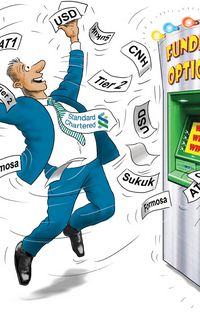Top of the pile
Against an at times stark backdrop, JP Morgan led in deal numbers and issuance volume in Latin America bonds in 2020. The bank brought forth many landmark transactions and was the first to reopen LatAm markets following the initial Covid-19 shutdown in March and April. JP Morgan is IFR’s Latin America Bond House of the Year.
![]()
Despite the uncertainty caused by the Covid-19 pandemic, JP Morgan led the way in Latin America’s bond market, not only in league table terms, but also by working on some of the region’s most significant deals.
The bank led the competition with 55 transactions completed in 2020 for US$13.9bn of league table credit. In terms of number of deals, that was 19 more than the second-placed bank, while in volume terms JP Morgan was nearly US$1bn ahead.
“We were very focused in helping our clients navigate this storm and we did it in different ways,” said Lisandro Miguens, JP Morgan’s head of Latin America debt capital markets. “We did it through helping them raise capital and we did it by giving them balance sheet. We also helped our clients when they were going through very difficult moments.”
JP Morgan led the first deal out of Latin America following the global shutdowns prompted by the Covid-19 pandemic. After about a month without primary issuance from regional borrowers, Panama approached international investors in March with a US$2.5bn 2056 note.
The transaction was well received and drew about US$7.5bn in demand, and in the process cleared the way for other borrowers to follow.
“We were the first ones to go to the market with Panama. We had to defy the market and be able to sell the story at that moment in time with a lot of uncertainty. It was only about 15 days after Covid [became a global crisis] and when we were all grounded, working from home,” said Miguens.
Another notable sovereign deal was for Mexico in April. The sovereign sold a US$6bn offering comprising 2025, 2032 and 2051 maturities after drawing orders of about US$25bn. While Mexico had to pay up, the country was facing two crises – the pandemic and the collapse in oil prices.
JP Morgan was also a lead on the first non-sovereign deal following the Covid-19 shutdowns when it helped Santander Mexico sell a US$1.75bn 2025 bond in April. Books reached US$5.8bn, enabling leads to revise pricing to 5.375% from 6% area. The steep tightening reflected the still uncertain environment that bond syndicates were operating in.
Another highlight came with the bank’s involvement in raising a US$2bn debtor-in-possession financing for Colombian airline Avianca following a Chapter 11 filing.
And in the ever-growing market for ESG investments, JP Morgan also stood out as global coordinator on a landmark transaction for Suzano in the sustainability-linked bond space.
In September the Brazilian pulp and paper company sold the first SLB from a Latin American borrower and became only the second global issuer to sell any such securities following Italian gas and electricity company Enel.
Suzano sold a US$750m 10-year SLB at a yield of 3.95% in a popular transaction that drew US$7bn in orders. The notes carried a 25bp step-up penalty tied to the company's goals of reducing carbon emissions by 15% by 2030.
“We have a team that is dedicated to green and sustainable financing. The people who work in that team have been spearheading many of the principles being written,” said Miguens.
Suzano tapped the deal in November for US$500m, taking advantage of a rally in its bonds.
To see the digital version of this report, please click here
To purchase printed copies or a PDF of this report, please email gloria.balbastro@lseg.com


